《现在完成时中since和for的用法》知识讲解
中考英语:since与for用法
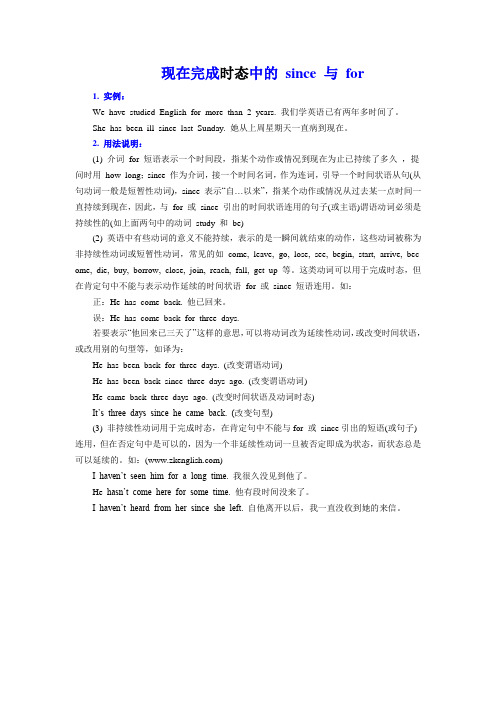
现在完成时态中的since 与for1. 实例:We have studied English for more than 2 years. 我们学英语已有两年多时间了。
She has been ill since last Sunday. 她从上周星期天一直病到现在。
2. 用法说明:(1) 介词for 短语表示一个时间段,指某个动作或情况到现在为止已持续了多久,提问时用how long;since 作为介词,接一个时间名词,作为连词,引导一个时间状语从句(从句动词一般是短暂性动词),since 表示“自…以来”,指某个动作或情况从过去某一点时间一直持续到现在,因此,与for 或since 引出的时间状语连用的句子(或主语)谓语动词必须是持续性的(如上面两句中的动词study 和be)(2) 英语中有些动词的意义不能持续,表示的是一瞬间就结束的动作,这些动词被称为非持续性动词或短暂性动词,常见的如come, leave, go, lose, see, begin, start, arrive, bec ome, die, buy, borrow, close, join, reach, fall, get up 等。
这类动词可以用于完成时态,但在肯定句中不能与表示动作延续的时间状语for 或since 短语连用。
如:正:He has come back. 他已回来。
误:He has come back for three days.若要表示“他回来已三天了”这样的意思,可以将动词改为延续性动词,或改变时间状语,或改用别的句型等,如译为:He has been back for three days. (改变谓语动词)He has been back since three days ago. (改变谓语动词)He came back three days ago. (改变时间状语及动词时态)It’s three days since he came back. (改变句型)(3) 非持续性动词用于完成时态,在肯定句中不能与for 或since引出的短语(或句子)连用,但在否定句中是可以的,因为一个非延续性动词一旦被否定即成为状态,而状态总是可以延续的。
现在完成时以及for,since的用法
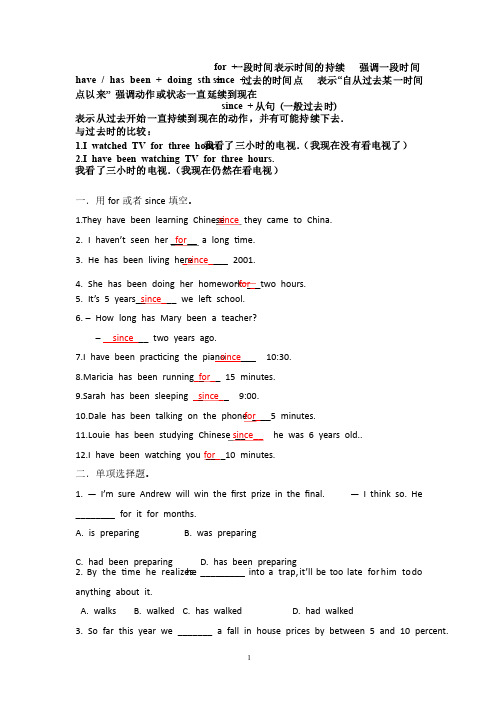
for +一段时间表示时间的持续 强调一段时间 have / has been + doing sth + since +过去的时间点 表示“自从过去某一时间 点以来” 强调动作或状态一直延续到现在 since + 从句 (一般过去时) 表示从过去开始一直持续到现在的动作,并有可能持续下去.与过去时的比较:1.I watched TV for three hours.我看了三小时的电视.(我现在没有看电视了)2.I have been watching TV for three hours. 我看了三小时的电视.(我现在仍然在看电视)一.用for 或者since 填空。
填空。
1.They have been learning Chinese since they came to China. 2. I haven’t seen her ___for __ a long me. 3. He has been living here _since____ 2001. 4. She has been doing her homework __for__two hours. 5. It’s 5 years __since___ we le school. 6. – How long has Mary been a teacher? – __since___ two years ago. 7.I have been prac cing the piano _since ___ 10:30. 8.Maricia has been running __for__ 15 minutes. 9.Sarah has been sleeping ___since__ 9:00. 10.Dale has been talking on the phone __for___5 minutes. 11.Louie has been studying Chinese __since__ he was 6 years old.. 12.I have been watching you __for__10 minutes. 二.单项选择题。
初中英语since与for的语法大全.doc
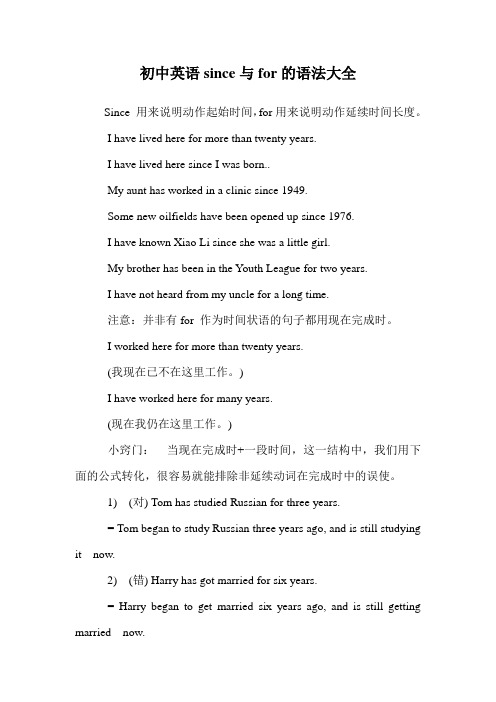
初中英语since与for的语法大全Since 用来说明动作起始时间,for用来说明动作延续时间长度。
I have lived here for more than twenty years.I have lived here since I was born..My aunt has worked in a clinic since 1949.Some new oilfields have been opened up since 1976.I have known Xiao Li since she was a little girl.My brother has been in the Youth League for two years.I have not heard from my uncle for a long time.注意:并非有for 作为时间状语的句子都用现在完成时。
I worked here for more than twenty years.(我现在已不在这里工作。
)I have worked here for many years.(现在我仍在这里工作。
)小窍门:当现在完成时+一段时间,这一结构中,我们用下面的公式转化,很容易就能排除非延续动词在完成时中的误使。
1)(对) Tom has studied Russian for three years.= Tom began to study Russian three years ago, and is still studying it now.2)(错) Harry has got married for six years.= Harry began to get married six years ago, and is still getting married now.显然,第二句不对,它应改为Harry got married six years ago.或Harry has been married for six years.对于since与for的比较,同学们看完之后是否已经知道了他们的区别呢?。
【初中英语】初中英语语法since和for用法讲解

【初中英语】初中英语语法since和for用法讲解
【—语法since和for用法讲解r】大家在学习英语时,有很多的词表示同一个意思但是用法有很大的区别哦,今天老师就来为大家讲解一下since和for的用法,希望对大家有所帮助。
比较自始至终
since用来说明动作起始时间,for用来说明动作延续时间长度。
例如:我已经活了二十多年了。
我在这里住了二十多年了。
ihavelivedheresinceiwasborn.我从出生起就住在这儿了。
注:并非所有以for作为时间状语的句子都使用现在完成时。
iworkedhereformorethantwentyyears.(我现在已不在这里工作。
)
我在这里工作了好几年。
我现在还在这里工作
注意:用句型转换的方法,很容易排除非延续动词在有for/since结构的完成时中的误用。
1)汤姆学习俄语已经三年了,三年前开始学习俄语,现在仍在学习。
2)(错)harryhasgotmarriedforsixyears.=harrybegantogetmarriedsixyearsago,andisst illgettingmarriednow.
显然,第二句是错的。
它应该改为Harry GOTM arriedsix YearsGo或Harry Hasbeen HarriedSix Years
同学们,看看since和for的用法比较,大家有没有清楚一点呀,多多看看哦。
《现在完成时中since和for的用法》知识讲解

《现在完成时中s i n c e和f o r的用法》《现在完成时中since和for的用法》微课讲课稿一、引入新课同学们好,本节课我们主要学习现在完成时中since和for的用法二、学习for的用法首先,我们来看两个句子Number OneI came to this school last week. 我上周六到这所学校Number TwoI have been in the new school for a week. 我到这所新学校已经一周了我们来看一下,第一句中的last week用于一般过去时的句子,第二句中的for a week用于现在完成时的句子。
a week 是一个时间段,因此我们用“for+时间段”来表达一段时间。
那同学们看一下,如果我们把第一句话中的last week 改成last year,那么第二句话中的for a week该改成什么呢?对,应该变成for a year.三、学习since的用法接下来,我们再看两个句子Number OneLily left home last Friday. 丽丽上周五离开家Number TwoLily has been away from home since last Friday. 丽丽自从上周五已离开家我们来看一下,第一句中的last Friday是过去的一个时间点,因此这句话用一般过去时表达,而第二句中since last Friday 用在现在完成时的句子中,last Friday 是一个过去的时间点,因此我们用“since +时间点”来表达一段时间它有三个具体用法,我们来详细学习一下1、since+过去一个时间点,如具体的年月、星期、小时。
eg:1990、last night、half past six我们来看一个例句:I have been here since 1990. 我自1990年以来一直在这里1990是过去的一个时间点,since 1990, 就是since+过去一个时间点来表达一段时间的第一个用法2、since+一段时间+ago,表示“自···时间前开始至今”我们来看一个例句:He has been here since five years ago. 他在这儿已经有5年了five years 是一段时间,since后不能直接跟时间段,但后面再跟ago是可以的,因此since five years ago 就是since+时间段+ago来表达一段时间的第二个用法3、since+一般过去时从句我们来看两个例句Number OneMany things have changed since you left. 自从你走后许多事情发生了变化“you left”是一个一般过去时从句。
英语单词辨析:for 和since的用法

英语单词辨析:for 和since的用法1. “since”是一个介词和副词,指过去某个特定的时间点,在事件、行动或状态的开始时使用。
另一方面,“for”意味着一个行为的预期目的,但当涉及到时间时,它显示了某个事物持续的时间量、范围或持续的时间。
2.而“for”表示特定的时间段或持续时间,“since”用于表示特定的时间。
3.当我们用“since”这个词来指一个特定的时间时,主句中使用的动词要么是现在或过去完成时,要么是现在或过去完成连续时态。
此外,“since”不能用于将来时。
相反,“for”一词可用于所有时态。
for + 一段时间since + 过去的时间点 / 一段时间+ago /含有一般过去时的句子用for和since填空1)I have been in China () 3 years.2) My grandparents have lived here () two years ago.3) We have been friends () about three years.4) I have studied English () 3 years ago.5) They have lived there ()six years.6) He has taught in China () 2006.7) His English has improved a lot ()he joined the English club.8) He has learned much English () he went to England five years ago.2. 对含有for和since的句子提问用How long 多久1) I have been in China for (3 years).(提问)How long have you been in China?2) My parents have lived here since (two years) ago.How long have your parents lived here?3. since前的句子用现在完成时;since后的句子用一般过去时.1) l() (be) in China since I () (come) here.2) His oral English () (improve) since he (join) the English club.4. 在现在完成时中,瞬间动词不能与含for和since表示一段的时间状语连用,如果要连用,瞬间动词要作相应的变化应转换成延续性动词,变化如下:leave ______ be away (from)die ______be deadbuy _______ haveborrow _____ keepjoin _______ be in / be a member ofbegin _______ be oncome / go / arrive ______ be ineg:1) My grandfather has died for 30 years. (误)My grandfather has been dead for 30 years. (正)My grandfather has been dead since 30 years ago. (正) 2)I have borrowed the book for two weeks. (误)I have kept the book for two weeks. (正)I have kept the book since two weeks ago.(误)3)Lily has bought the skirt for five weeks.(误)Lily has had the skirt for five weeks. (正)Lily has had the skirt since five weeks ago.(正)5. 句型转换1) I joined the Army two years ago. (同义句)= I have been in the Army for two years.= I have been the member of the Army for two years. = I have been in the Army since two years ago.= It is two years since I joined the Army.= Two years has passed since I joined the Army.2) Her father died three years ago. (同义句)= Her father has been dead for three years.= Her father has been dead since three years ago.= It is three years since her father died.= Three years has passed since her father died.。
现在完成时Since和for的用法

现在完成时Since和for的用法Since 和for 的用法表示过去已经开始持续到现在的动作或状态常用的时间状语有:for, since, how long, so far, these days等。
Since+过去点的时间,for+一段时间(数词+量词),此划线部分用how long提问。
一、since短语或从句表示过去的动作延续至今,since之后的时间为一点。
如:Mr. Smith has worked here since 1984. 1984年以来,史密斯先生一直在这工作。
He’s learned about 5,000 English words since he went to college. 他上大学以来大约学了五千个英语单词。
二、for短语表示动作延续多长时间,for的宾语为时间段。
如:We have known each other for twenty years. 我们认识有二十年了。
I haven’t seen her for a long time. 我好久没有见到她了。
练习:用since和for填空1) ______ two years 2) _______ two years ago 3) _______ last month4) ______ 1999 5) _______ yesterday 6) _______ 4 o’clock7) ______ 4 hours 8) _______ an hour ago 9) _______ we were children10) _____ lunch time 11) ______ she left here1. He has lived in Nanjing ________ the year before last.2. I’ve known him __________ we were children.3. Our teacher has studied Japanese _________ three years.4. She has been away from the city ___________ about ten years.5. It’s about ten years __________she left the city.2.短暂性转换延续性①arrive at/in sw. get to/reach sw. come/go/move to sw.→ be in sw./at school/at home/on the farm/be here/be there1) He got to Beijing five minutes ago.He ________ _________ _________ Beijing for _________ _________.2) I moved to the USA last year.I ________ ________ __________ the USA since __________ __________.3) I went home yesterday.I _______ ________ _________ home for _________ __________.4) They came here last week.They _________ _________ here since _________ __________.②come/go back, return → be back come/go out → be out1) He came out two years ago.He _________ __________ _________ for __________ __________.2) We return to Fuzhou yesterday.We ________ ________ _________ to Fuzhou since __________.③become → be1) I became a teacher in 2000.I ________ __________ a teacher for _________ _________.2) The river became dirty last year.The river _________ _________ dirty for _________ __________.④close → be closed open → be open1) The shop closed two hours ago.The shop ________ _________ _________ for _________ _________.2) The door opened at six in the morning.The door ________ ________ ________ for six hours.⑤get up → be up die → be deadleave sw. → be away from sw.fall asleep/get tot sleep → be asleepfinish/end → be over marry → be married1) I got up two hours ago.I ________ ________ ________ since ________ ________.2) He left Fuzhou just now.He _______ ________ ________ _________ Fuzhou for five minutes.3) My grandpa died in 2002.My grandpa _______ _______ ________for _______ ________.4) The meeting finished at six.The meeting ________ ______ ______ for six hours.5) I got to sleep two hours ago.I ________ _________ _________ since _________ __________.6) They married in 1990.They ________ _________ __________since _________.⑥start/begin to do sth. → do sth. begin → be on1) I began to teach at this school in 1995.I ____ ____ at this school since ____.2) The film began two minutes ago.The film ____ ____ ____ for ____ ____.⑦borrow → keep lose → not have buy → have put on → wearcatch/get a cold → have a cold get to know → know1) They borrowed it last week.They _________ _________ it since __________ __________.2) I bought a pen two hours ago.I _________ _________ a pen for ________ __________.3) I got to know him last year.I _________ __________ him since __________ __________.4) I put on my glasses three years ago.I __________ __________ my glasses for _________ _________.⑧have/has gone to → have been in1) He has gone to Beijing.He ____ ____ _____ Beijing for two days.⑨join the league/the Party/the army→ be a league/a Party member/a soldier→ be a membe r of the league/the Party→ be in the league/the Party/the army1) He joined the league in 2002.He ________ _________ a _________ _________ for two years.He ________ __________ a __________ ___________ the __________ for two years.He ____________ ___________ ___________ the league for two years.2) My brother joined the army two years ago.My brother __________ __________ a ___________ for ___________ ___________. My brother ___________ ___________ in ____________ ___________ for two years.3.汉译英1)这本字典我已买了三年了。
现完第二课时 基本意义 since for

John: Oh, she has just(刚刚) bought some.
A: Have you surfed the Internet? B: Yes, I have . / No, I haven’t.
talk on the phone for an hour
play soccer
eat French Fries
用所给动词的适当形式填空
I ____(wait) for him for two hours . I am very angry .
1.
2. He _____ (be) a doctor since he was twenty . 3. The film ____ (be) on for fifteen minutes .
She has just left.
(have-had)
Have you had breakfast ? (leave-left)
Translate them into English. 1.你以前做过风筝吗? Have you made a kite before ? 2. 我从来没有见过这么奇怪的人. I’ve never seen such a strange man. 3. 到现在你学了多少英语单词? How many English words have you learned so far? 4. 这部电影他已经看过5遍了. He has already seen this film 5 times. 5. 最近有没有读一些有趣的书? Have you read any interesting books recently ? 6 . 在过去几天里, 你吃了什么? What have you eaten in the past several days? 7. 自从她搬到上海以后, 我就没见过她. I haven’t met her since she moved to Shanghai .
【初中英语】初中英语since与for的语法大全
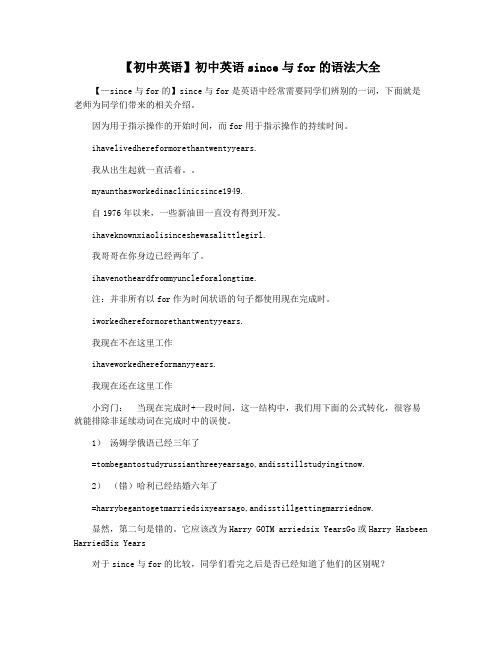
【初中英语】初中英语since与for的语法大全【—since与for的】since与for是英语中经常需要同学们辨别的一词,下面就是老师为同学们带来的相关介绍。
因为用于指示操作的开始时间,而for用于指示操作的持续时间。
ihavelivedhereformorethantwentyyears.我从出生起就一直活着。
myaunthasworkedinaclinicsince1949.自1976年以来,一些新油田一直没有得到开发。
ihaveknownxiaolisinceshewasalittlegirl.我哥哥在你身边已经两年了。
ihavenotheardfrommyuncleforalongtime.注:并非所有以for作为时间状语的句子都使用现在完成时。
iworkedhereformorethantwentyyears.我现在不在这里工作ihaveworkedhereformanyyears.我现在还在这里工作小窍门:当现在完成时+一段时间,这一结构中,我们用下面的公式转化,很容易就能排除非延续动词在完成时中的误使。
1)汤姆学俄语已经三年了=tombegantostudyrussianthreeyearsago,andisstillstudyingitnow.2)(错)哈利已经结婚六年了=harrybegantogetmarriedsixyearsago,andisstillgettingmarriednow.显然,第二句是错的。
它应该改为Harry GOTM arriedsix YearsGo或Harry Hasbeen HarriedSix Years对于since与for的比较,同学们看完之后是否已经知道了他们的区别呢?。
彭雪梅For和since在现在完成时的应用--知识讲解
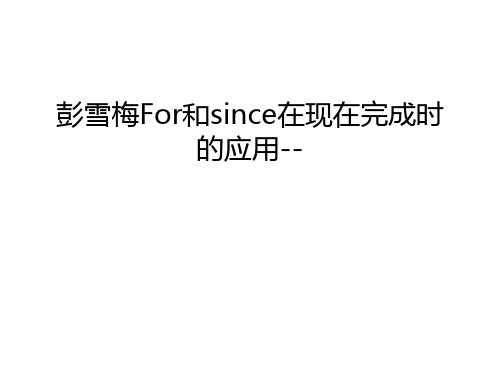
• A: The film _______ for a long time。 • B: I agree with you. We can be happy to
enjoy the rest part, so we don’t need to hurry up. • A. has been on • B. didn’t begin • C. has begun • D. hasn’t begun
I haven’t had the bike for a year. √
I haven’t bought the bike for a year. √
●但在否定句中,短暂性动词可以与时间段连用。
• The film _______ for a long time, so there is no one in the cinema.
从句”连用,主句的动词应为延续性动词,而题目中所给 的begin和finish均为短暂性动词,不能在有“since从句” 的现在完成时句子中使用。所以答案只能选择B。再根据
题干所给的后半句,我们得知她错过了电影的开头部分, 与B选项所要表达的意思一致,故推出B为正确选项。译
文:自从玛丽来到电影院,电影已经放映了,所以她错过 了电影的开头部分。
• A. has begun; comes into • B. has been on; came into • C. has finished; came into • D. has been over; came into
• 【答案及解释】B。首先观察题中所给的4个选项,以及前 半句中解题关键的“since”。我们知道第一空使用了现在 完成时,而现在完成时中since引导的从句动词时态应用 一般过去式,故排除A和 C。此外,现在完成时与“since
初中二年级英语复习知识点(for since 用法)

初中二年级英语复习知识点(for since 用
法)
for 的用法:1)在回答How long?的问句时,for表示所指时间或距离的全部,在这个含义上与表示“特定期间中某个长度”的during 不同。
2)可以用在过去时,现在时,将来时中,但是若表示持续进行到现在为止时,则不能用现在时,而要用现在完成时。
3)表示某事物在所述时间要发生。
since 用法:1)conj.自以后;自从,后接从句表示以过去的某个时间为起点,持续到现在或过去的某个时候。
Since 之后可以接过去时的句子,也可以接表示过去的时间点。
2)prep.自来,从(至今)
注意since除了可以与现在完成时连用外,还可以与过去完成时,现在完成进行时连用。
扩展since, for都可以与完成时态连用。
Since用来说明动作的起始时间,而for用来说明动作延续时间,因此,since后跟表示某一时间点的名词短语,for后面跟表示一段时间的名词短语
以上就是为大家提供的初中二年级英语复习知识点
(for since 用法),大家仔细阅读了吗?加油哦!
八年级英语必修知识点:“be+形容词”
2015八年级英语必修知识:while的用法
2014-2015初二年级第二学期英语知识点(全册)。
现在完成时Since和for的用法
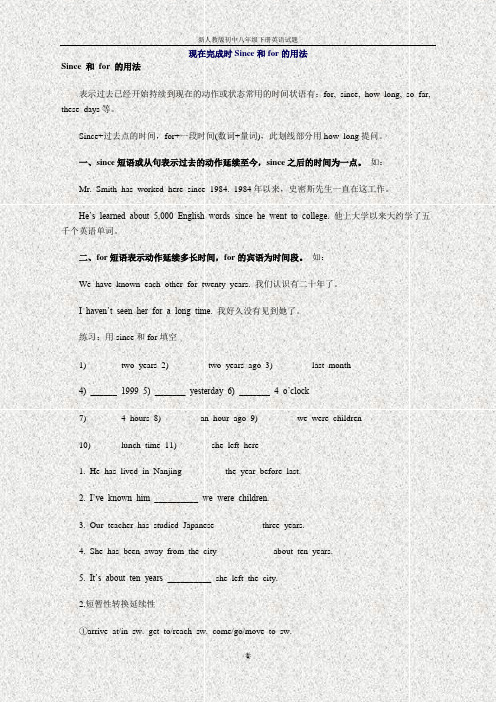
现在完成时Since和for的用法Since 和for 的用法表示过去已经开始持续到现在的动作或状态常用的时间状语有:for, since, how long, so far, these days等。
Since+过去点的时间,for+一段时间(数词+量词),此划线部分用how long提问。
一、since短语或从句表示过去的动作延续至今,since之后的时间为一点。
如:Mr. Smith has worked here since 1984. 1984年以来,史密斯先生一直在这工作。
He’s learned about 5,000 English words since he went to college. 他上大学以来大约学了五千个英语单词。
二、for短语表示动作延续多长时间,for的宾语为时间段。
如:We have known each other for twenty years. 我们认识有二十年了。
I haven’t seen her for a long time. 我好久没有见到她了。
练习:用since和for填空1) ______ two years 2) _______ two years ago 3) _______ last month4) ______ 1999 5) _______ yesterday 6) _______ 4 o’clock7) ______ 4 hours 8) _______ an hour ago 9) _______ we were children10) _____ lunch time 11) ______ she left here1. He has lived in Nanjing ________ the year before last.2. I’ve known him __________ we were children.3. Our teacher has studied Japanese _________ three years.4. She has been away from the city ___________ about ten years.5. It’s about ten years __________she left the city.2.短暂性转换延续性①arrive at/in sw. get to/reach sw. come/go/move to sw.→ be in sw./at school/at home/on the farm/be here/be there1) He got to Beijing five minutes ago.He ________ _________ _________ Beijing for _________ _________.2) I moved to the USA last year.I ________ ________ __________ the USA since __________ __________.3) I went home yesterday.I _______ ________ _________ home for _________ __________.4) They came here last week.They _________ _________ here since _________ __________.②come/go back, return → be back come/go out → be out1) He came out two years ago.He _________ __________ _________ for __________ __________.2) We return to Fuzhou yesterday.We ________ ________ _________ to Fuzhou since __________.③become → be1) I became a teacher in 2000.I ________ __________ a teacher for _________ _________.2) The river became dirty last year.The river _________ _________ dirty for _________ __________.④close → be closed open → be open1) The shop closed two hours ago.The shop ________ _________ _________ for _________ _________.2) The door opened at six in the morning.The door ________ ________ ________ for six hours.⑤get up → be up die → be deadleave sw. → be away from sw.fall asleep/get tot sleep → be asleepfinish/end → be over marry → be married1) I got up two hours ago.I ________ ________ ________ since ________ ________.2) He left Fuzhou just now.He _______ ________ ________ _________ Fuzhou for five minutes.3) My grandpa died in 2002.My grandpa _______ _______ ________for _______ ________.4) The meeting finished at six.The meeting ________ ______ ______ for six hours.5) I got to sleep two hours ago.I ________ _________ _________ since _________ __________.6) They married in 1990.They ________ _________ __________since _________.⑥start/begin to do sth. → do sth. begin → be on1) I began to teach at this school in 1995.I ____ ____ at this school since ____.2) The film began two minutes ago.The film ____ ____ ____ for ____ ____.⑦borrow → keep lose → not have buy → have put on → wearcatch/get a cold → have a cold get to know → know1) They borrowed it last week.They _________ _________ it since __________ __________.2) I bought a pen two hours ago.I _________ _________ a pen for ________ __________.3) I got to know him last year.I _________ __________ him since __________ __________.4) I put on my glasses three years ago.I __________ __________ my glasses for _________ _________.⑧have/has gone to → have been in1) He has gone to Beijing.He ____ ____ _____ Beijing for two days.⑨join the league/the Party/the army→ be a league/a Party member/a soldier→ be a membe r of the league/the Party→ be in the league/the Party/the army1) He joined the league in 2002.He ________ _________ a _________ _________ for two years.He ________ __________ a __________ ___________ the __________ for two years. He ____________ ___________ ___________ the league for two years.2) My brother joined the army two years ago.My brother __________ __________ a ___________ for ___________ ___________. My brother ___________ ___________ in ____________ ___________ for two years.3.汉译英1)这本字典我已买了三年了。
现在完成时的持续型用法

现在完成时的持续型用法现在完成时还可表示过去某一时间开始并一直持续到现在(包括“现在”在内)的动作或状态,该用法中的动词多是延续性动词,常见的时态标志词有since和 for。
1. since意为“自从……以来”,它既可作介词,也可作连词。
作介词时,后接表示过去的时间点,表示某事开始的时间;作连词时,引导时间状语从句,从句常用一般过去时。
如:Mr. Miller has lived here since five years ago.(since+时间段+ago)I have had the dictionary since I was ten.(since+“一般过去时”)2. for作介词,后接一段时间,表示一个动作或一种状态已经持续了多长时间。
如:Miss Green has taught in the village for three years.Kate has been here for two hours.注意:1. 对since和 for引导的时间状语提问时,常用how long。
如:I have worked here for two years. (对划线部分提问)How long have you worked here?2. 在现在完成时中,含有for和since的句子可以相互转换。
如:Mary has been in Beijing for two days.(for+时间段)=Mary has been in Beijing since two days ago.(since+时间段+ago)3. 在现在完成时中,表示短暂意义的动词(如come和see)在肯定句和一般疑问句中不能和表示一段时间的时间状语连用,但在否定句中是可以的。
如:Bill has come here for an hour. (×)I haven’t seen Kate for three years. (√)4. It has been / It’s +时间段+since从句(一般过去时). 表示:“自从……以来,有多长时间了。
Since 和 for 的用法及区别

Since 和for 的用法及区别:一,since 的四种用法1,since + 过去一个时间点如具体的年、月、日期、钟点、eg. 1990 ; last month ; half past sixI have been here since 1990. 1990起;我一直在这儿.. 2; since+ 一段时间+agoI have been here since five months ago..自从五个月前;我已经在这儿了..3; since+从句Great changes have taken place since you left. 自从你走后;已经发生了很大的变化..4;It is +一段时间+since 从句It is two years since I became an English teacher. 我成为英语老师有两年了..Since 和for区别Since +时间点;具体时间;“自从、、、以来;从、、、以后”用来说明动作起始时间I have been in Beijing since 2010.For + 时间段;用来说明动作延续时间长度;因此句中的谓语动词;也应该是延续性动词..I have been in Beijing for one year..We have learnt English for about three years.I have been here for 3 days. 对I have arrived here for 3 days.误延续性动词和终止性动词的概念英语中;动词按其动作发生的方式、动作发生过程的长短;可分为延续性动词和终止性动词..延续性动词表示能够延续的动作;这种动作可以延续下去或产生持久影响..如:learn; work; stand; lie; know; walk; keep; have; wait; watch; sing; read; sleep; live; stay等..终止性动词也称非延续性动词、瞬间动词或短暂性动词;表示不能延续的动作;这种动作发生后立即结束..如open; close; finish; begin; come; go; arrive; reach; get to; leave; move; borrow;buy等..一、延续性动词的用法特征1.延续性动词可以用于现在完成时;其完成时态可与表示"段时间"的状语连用..表示"段时间"的短语有:for two years; during the past three years; since last year; how long等..如:I have learned English since I came here.自从我来到这儿就学英语了..2.延续性动词不能与表示短暂时间的"点时间"状语连用..如:It raind at eight yesterday morning.误rain为延续性动词;而at eight表示"点时间";前后显然矛盾..如果用延续性动词表示一瞬间的动作;可以借助come; begin; get等终止性动词来表示..上句可改为:It began to rain at eight yesterday morning.正又如:-When did you get to know Jack-Two years ago.-Then you've known each other for more than two years.-That's right.二、终止性动词的用法特征1.终止性动词可用来表示某一动作完成;因此可用于现在完成时..如:The train has arrived.火车到了..Have you joined the computer group 你加入电脑小组了吗2.终止性动词表示的动作极其短暂;不能持续..因此;不可与表示一段时间的状语连用只限肯定式..如:1他死了三年了..误:He has died for three years.正:He has been dead for three years.正:He died three years ago.正:It is three years since he died.正:Three years has passed since he died.2他来这儿五天了..误:He has come here for five days.正:He has been here for five days.正:He came here five days ago.正:It is five days since he came here.正:Five days has passed since he came here.句中终止性动词转换为相应的延续性动词;如上面两例中的第一种正确表达方式..下面列举几例:leave→be away; borrow→keep; buy→have; begin/start→be on; die→be dead; move to→live in; finish→be over; join→be in/be a member of; open sth.→keep sth. open; fall ill→be ill; get up→be up; catch a cold→have a cold..。
2022中考英语备考语法专题现在完成时难点解析

现在完成时难点解析一、for与since当句中有“for +段时间”或“since +点时间”等时,主句常用现在完成时,谓语动词必须是延续性动词,若是非延续性动词,要改为延续性动词或表状态的词(短语)。
1. for +一段时间I have been here for 2 weeks. 我到这里两周了。
He's studied English for 17 years. 他学习英语已经17年了。
2. since +表示过去某一时间的时间点I have been here since 3 years ago. 三年前我就来这里了。
I have been here since I graduated in 1988. 从1988年毕业后我就来这里了。
【温馨提示】since也可单独使用,表示“自那时起”;另外,since前也可加上ever,以加强语气。
It is nearly two years since I came here. 我来这儿快两年了。
I have been here (ever)since I graduated in 2015. 自从2015年毕业后我就来这儿了。
对for或since引导的时间状语提问必须用how long,不能用when。
—How long have you lived here?你住在这里多久了?—I have lived here for 10 years. 我住在这里10年了。
二、短暂性动词与延续性动词详解1. 短暂性动词:表示动作一开始马上就结束,不能延续,也叫非延续性动词或终止性动词。
常用的词有:begin 开始;close 关,关闭;finish 完成,结束;hear 听,听到,听说;lend 借给;marry 结婚,嫁,娶;open 打开;put 放;receive 收到,接收;sell 卖,推销;start 开始,出发;stop 停止,终止等。
Since和for的用法及区别
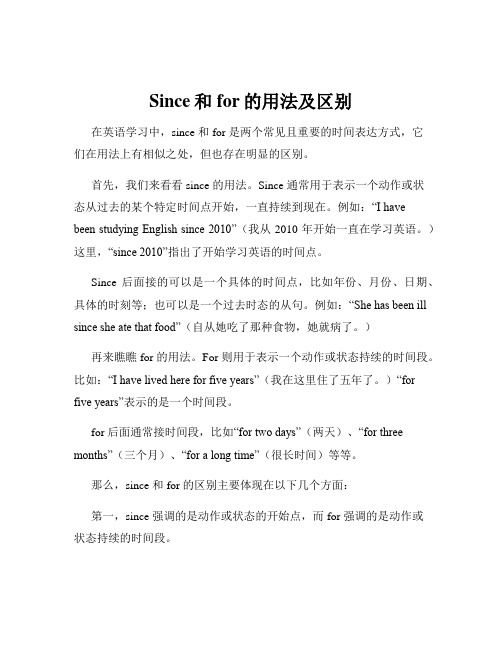
Since和for的用法及区别在英语学习中,since 和 for 是两个常见且重要的时间表达方式,它们在用法上有相似之处,但也存在明显的区别。
首先,我们来看看 since 的用法。
Since 通常用于表示一个动作或状态从过去的某个特定时间点开始,一直持续到现在。
例如:“I have been studying English since 2010”(我从 2010 年开始一直在学习英语。
)这里,“since 2010”指出了开始学习英语的时间点。
Since 后面接的可以是一个具体的时间点,比如年份、月份、日期、具体的时刻等;也可以是一个过去时态的从句。
例如:“She has been ill since she ate that food”(自从她吃了那种食物,她就病了。
)再来瞧瞧 for 的用法。
For 则用于表示一个动作或状态持续的时间段。
比如:“I have lived here for five years”(我在这里住了五年了。
)“for five years”表示的是一个时间段。
for 后面通常接时间段,比如“for two days”(两天)、“for three months”(三个月)、“for a long time”(很长时间)等等。
那么,since 和 for 的区别主要体现在以下几个方面:第一,since 强调的是动作或状态的开始点,而 for 强调的是动作或状态持续的时间段。
比如说,“He has been working since 8 o'clock this morning”(他从今天早上 8 点就一直在工作。
)这里用 since 指出了开始工作的具体时间点。
再看,“He has been working for three hours”(他已经工作了三个小时。
)这里用 for 说明了工作持续的时长。
第二,在句子的时态使用上,since 引导的句子通常使用现在完成时或现在完成进行时,而 for 引导的句子也多使用现在完成时。
2015必备的九年级英语知识点复习:since和for
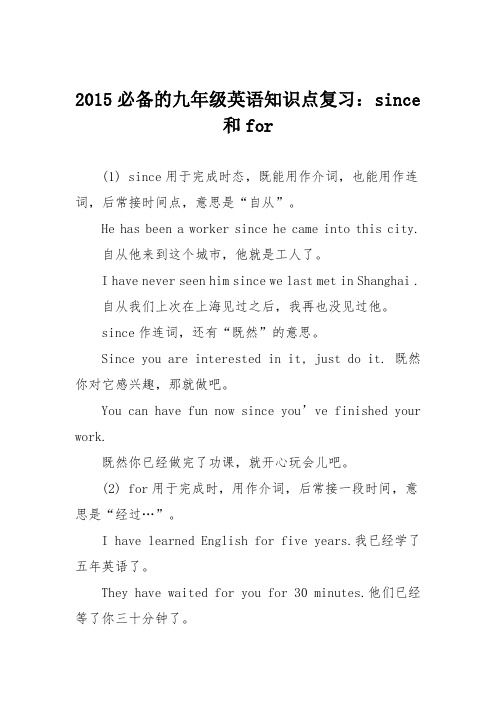
2015必备的九年级英语知识点复习:since
和for
(1) since用于完成时态,既能用作介词,也能用作连词,后常接时间点,意思是“自从”。
He has been a worker since he came into this city.
自从他来到这个城市,他就是工人了。
I have never seen him since we last met in Shanghai .
自从我们上次在上海见过之后,我再也没见过他。
since作连词,还有“既然”的意思。
Since you are interested in it, just do it. 既然你对它感兴趣,那就做吧。
You can have fun now since you’ve finished your work.
既然你已经做完了功课,就开心玩会儿吧。
(2) for用于完成时,用作介词,后常接一段时间,意思是“经过…”。
I have learned English for five years.我已经学了五年英语了。
They have waited for you for 30 minutes.他们已经等了你三十分钟了。
for也可以用作连词,但意思是“因为”。
They missed the flight for they were late.他们由于完到了而误了航班。
He fell ill for many reasons.他由于多种原因病倒了。
以上就是为大家整理的2015必备的九年级英语知识点复习:since和for,怎么样,大家还满意吗?希望对大家的学习有所帮助,同时也祝大家学习进步,考试顺利!。
什么时候用for什么时候用since

什么时候用for什么时候用since什么时候用for什么时候用since1,Since +时间点,具体时间“自从、、、以来,从、、、以后” 用来说明动作起始时间I have been in Beijing since 2010.2,For + 时间段,用来说明动作延续时间长度,因此句中的谓语动词,也应该是延续性动词。
I have been in Beijing for one year。
We have learnt English for about three years.I have been here for 3 days. (对)I have arrived here for 3 days.(误)for后面加的是一段时间,如 I have been here for a long time.since后面加的是时间点,代表的是自从,如I have been here since I was born.什么时候用Were,什么时候用was第一人称(I)和第三人称(he,she,it)用was,第二人称(you)用were什么时候用ARE,什么时候用doare用做第二人称的主系表结构,表语一般是名词或是形容词。
do是指实义动词,一般是主谓宾结构。
are一般翻译成是或者在,表示事物的属性、特征和状态。
do直接翻译成一个动作。
例如:We did our homework last night. 我们昨天晚上做作业了。
就不能说we are our homework.我们是作业。
同样We are 16 years old. 我们十六岁了。
The cars are blue.车是蓝色的。
The pen is on the desk. 笔在桌子上。
Those ladies are teachers. 那些女士是教师。
这样的句子里不能用do,因为主语并没有发出动作,只是在描述主语的一些状态和属性。
什么时候用wether什么时候用if一、引导宾语从句这时两者的含义区别很小,一般可通用.I don't know whether/if they will e to help us.但是,当whether与or not连成一个片语时,whether不可换用if.I don't know whether or not they will e for our help.若whether和or not不连在一起,在口语中可以用if取代whether,当然也可以用whether.I don't care if/whether your car breaks down or not.我不在乎您的车是否是会出故障.此外,还有三种情况值得注意:(1)在介词后面只能用whether,不能用if.I am not interested in whether you'll e or not.(2)在动词不定式之前,只能用whether,不能用if.He doesn't know whether to stay or not.(3)在及物运动discuss后的宾语从句中,只能用whether,不能用if.We discussed whether we should make a change in our plan.二、引导主语从句只能用whether,不能用if.It is unknown whether he will e.Whether the news is true remains a question.三、引导表语从句只能用whether,不能用ifThe question is whether they can take our advice.四、引导同位语从句常用whetherThe question whether he'll e is unknown.五、可以用来引导一个否定的宾语从句,whether则不能用来引导否定的宾语从句,因为它表示正反两方面的选择意义比较强.Tell me if it is not going to rain,please.六、if除引导宾语从句外,还可以引导条件状语从句,作“是否”解.在容易引起混淆产生歧义的情况下,就不可用if,而须用whether.Please let me know if you intend to e.这个句子有两种解释:A:“请让我们知道你是否想来.” B:“如果你打算来,请让我们知道.”在书面语中,如果我们想表达的第一种含义,就得用whether来改写第一句.Please let me know whether you intend to e.总之,whether在大多数情况下都可以用,而if则不然,有wether 和if时一般选wether不会有错,但是如果所需的意思是"如果",就只能选if。
- 1、下载文档前请自行甄别文档内容的完整性,平台不提供额外的编辑、内容补充、找答案等附加服务。
- 2、"仅部分预览"的文档,不可在线预览部分如存在完整性等问题,可反馈申请退款(可完整预览的文档不适用该条件!)。
- 3、如文档侵犯您的权益,请联系客服反馈,我们会尽快为您处理(人工客服工作时间:9:00-18:30)。
《现在完成时中s i n c e和f o r的用
法》
《现在完成时中since和for的用法》微课讲课稿
一、引入新课
同学们好,本节课我们主要学习现在完成时中since和for的用法
二、学习for的用法
首先,我们来看两个句子
Number One
I came to this school last week. 我上周六到这所学校
Number Two
I have been in the new school for a week. 我到这所新学校已经一周了
我们来看一下,第一句中的last week用于一般过去时的句子,第二句中的for a week用于现在完成时的句子。
a week 是一个时间段,因此我们用“for+时间段”来表达一段时间。
那同学们看一下,如果我们把第一句话中的last week 改成last year,那么第二句话中的for a week该改成什么呢?
对,应该变成for a year.
三、学习since的用法
接下来,我们再看两个句子
Number One
Lily left home last Friday. 丽丽上周五离开家
Number Two
Lily has been away from home since last Friday. 丽丽自从上周五已离开家
我们来看一下,第一句中的last Friday是过去的一个时间点,因此这句话用一般过去时表达,而第二句中since last Friday 用在现在完成时的句子
中,last Friday 是一个过去的时间点,因此我们用“since +时间点”来表达一段时间
它有三个具体用法,我们来详细学习一下
1、since+过去一个时间点,如具体的年月、星期、小时。
eg:1990、last night、half past six
我们来看一个例句:
I have been here since 1990. 我自1990年以来一直在这里
1990是过去的一个时间点,since 1990, 就是since+过去一个时间点来表达一段时间的第一个用法
2、since+一段时间+ago,表示“自···时间前开始至今”
我们来看一个例句:
He has been here since five years ago. 他在这儿已经有5年了
five years 是一段时间,since后不能直接跟时间段,但后面再跟ago是可以的,因此since five years ago 就是since+时间段+ago来表达一段时间的第二个用法
3、since+一般过去时从句
我们来看两个例句
Number One
Many things have changed since you left. 自从你走后许多事情发生了变化“you left”是一个一般过去时从句。
since you left 就是since+一般过去时从句的用法。
Number Two
It is two years since I became an English teacher. 我成为英语老师两年了。
I became an English teacher是一个一般过去时从句,这也是since+一般过
去时从句的一个用法,另外我们要特别注意第二个句子,它也是一个特殊的句型。
具体的结构就是it is +时间段+since+一般过去时从句,这里的it is还可以换成it has been,例如:我成为一名学生已经三年了。
既可以表达成It is three years since I became a student. 也可以表达成It has been three years since I became a student.
四、课堂检测
现在,关于since和for的用法同学们都掌握住了吗?我们来进行检测
Fill in the blanks with “for” or “since”. 用for和since填空.
第一句中he was six years old是一个一般过去时的从句,因此这里填since
His father has been died since he was six years old.
第二句中six years是过去的一个时间段,for+时间段,这里应填for
Michael has been away from the army for six years.
第三句中2003是过去的一个时间点,since+时间点,因此这里应填since He has been in Chongqing since 2003.
第四句中two months 是一个时间段,for+时间段,这里填for
My brother has had a car for two months.
第五句中5:00 a.m.属于一个时间点,since+时间点,应填since
Tom has left a book since 5:00 a.m.
以上5个小题你都做对了吗?
其实,有时since和for在句子中是可以相互转换的.
我们来看下面两个句子,试着做一下
1、I have been here for ten years. 可以换成I have been here since ten years ago.
这里since后不能跟时间段ten years,但再跟ago就可以了
2、He has studied English since 2005. 可以换成He has studied English for ten
years. 对了,因为for后跟时间段,2005到今年正好是十年,所以我们就可以用for ten years 来表达,另外这个句子还可以换成It is ten years since he studied English. 这就是我们刚才说的特殊句型。
It is +时间段+since+一般过去时从句.
五、结束语
OK. This class is over. See you next time. Goodbye!。
